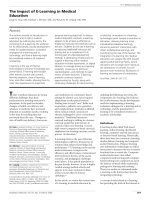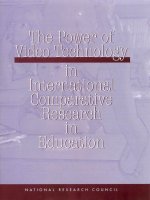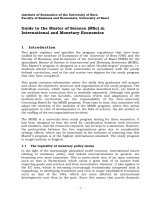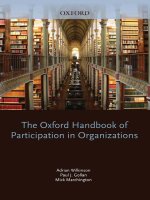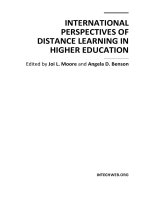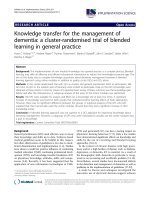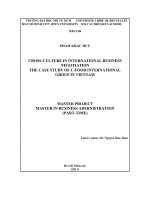THE PALGRAVE HANDBOOK OF EXPERIENTIAL LEARNING IN INTERNATIONAL BUSINESS
Bạn đang xem bản rút gọn của tài liệu. Xem và tải ngay bản đầy đủ của tài liệu tại đây (3.86 MB, 943 trang )
The Palgrave Handbook of
Experiential Learning in
International Business
Edited by
Vas Taras
Maria Alejandra Gonzalez-Perez
The Palgrave Handbook of Experiential Learning in
International Business
This page intentionally left blank
The Palgrave Handbook of
Experiential Learning in
International Business
Edited by
Vas Taras
University of North Carolina, USA
Maria Alejandra Gonzalez-Perez
Universidad EAFIT, Colombia
Selection and editorial content © Vas Taras and Maria Alejandra
Gonzalez-Perez 2015
Individual chapters © Respective authors 2015
Softcover reprint of the hardcover 1st edition 2015 978-1-137-46770-6
All rights reserved. No reproduction, copy or transmission of this
publication may be made without written permission.
No portion of this publication may be reproduced, copied or transmitted
save with written permission or in accordance with the provisions of the
Copyright, Designs and Patents Act 1988, or under the terms of any licence
permitting limited copying issued by the Copyright Licensing Agency,
Saffron House, 6–10 Kirby Street, London EC1N 8TS.
Any person who does any unauthorized act in relation to this publication
may be liable to criminal prosecution and civil claims for damages.
The authors have asserted their rights to be identified as the authors of this
work in accordance with the Copyright, Designs and Patents Act 1988.
First published 2015 by
PALGRAVE MACMILLAN
Palgrave Macmillan in the UK is an imprint of Macmillan Publishers Limited,
registered in England, company number 785998, of Houndmills, Basingstoke,
Hampshire RG21 6XS.
Palgrave Macmillan in the US is a division of St Martin’s Press LLC,
175 Fifth Avenue, New York, NY 10010.
Palgrave Macmillan is the global academic imprint of the above companies
and has companies and representatives throughout the world.
Palgrave® and Macmillan® are registered trademarks in the United States,
the United Kingdom, Europe and other countries.
ISBN 978-1-349-50005-5
ISBN 978-1-137-46772-0 (eBook)
DOI 10.1057/9781137467720
This book is printed on paper suitable for recycling and made from fully
managed and sustained forest sources. Logging, pulping and manufacturing
processes are expected to conform to the environmental regulations of the
country of origin.
A catalogue record for this book is available from the British Library.
A catalog record for this book is available from the Library of Congress.
Contents
List of Figures
x
List of Tables
xiv
Acknowledgements
xvii
Notes on Contributors
xix
Part I Theories and Concepts of Experiential Learning in
International Business/International Management
1 Introduction: Experiencing the World
Allan Bird
2 Conceptual and Theoretical Foundations: Experiential Learning
in International Business and International Management Fields
Maria Alejandra Gonzalez-Perez and Vas Taras
3 Teaching International Business without Teaching International
Business: Opportunities through Considering the Students’
International Environment
Christian Zuber and Hans-Christian Pfohl
4 Students as Global Virtual Team Leaders: A Model for
Enquiry-Based Experiential Learning
Peter Zettinig, Audra I. Mockaitis, and Lena Zander
5 Integrated Experiential Learning: Africa and the United States
Lucy Ojode
6 A Model of the Firm’s Sources of Experiential Knowledge in the
Internationalization Process
Luis Alfonso Dau
7 A Comprehensive Approach to Understand Learning Styles across
Countries: A Comparison between the Japanese and Thai
Employees of Japanese MNCs
Yoshitaka Yamazaki and Thitiwat Attrapreyangkul
8 Investing in Human Capital through Training and Development:
An Experiential Learning Framework
Adrienne A. Isakovic
v
3
12
17
33
51
65
91
113
vi Contents
Part II Examples of Experiential Learning Projects in
International Business/International Management
9 X-Culture: Challenges and Best Practices of Large-Scale
Experiential Collaborative Projects
Vas Taras and Xavier Ordeñana
131
10 A Decade of Global Enterprise Experiences
Deb Gilbertson and Virginia Cathro
149
11 Designing Experiential into an International Business Programme
Allan Bird, Henry W. Lane, and Nicholas Athanassiou
169
12 Combining Cross-Border Online Teams and Field Projects in
Developing Entrepreneurial Competencies
Tiit Elenurm
186
13 Alternative Modes of Teaching International Business: Online
Experiential Learning
Meena Chavan
202
14 Intergenerational and Multicultural Experiential Learning in
International Business Education
Alfredo Jiménez and Carmen Palmero
223
15 Action Learning for International Business Students: The Role of
Global Consulting Projects in the MBA Curriculum
James P. Johnson and D. Michael Brown
235
16 It Takes a Global Village: A Network Approach to Providing
Executive MBA Students with a Truly Global Experience
José R. de la Torre
252
17 The Role of Experiential Learning in Educating Responsible
Citizens
Weng Si (Clara) Lei, Ching Chi Cindia Lam, Fernando Lourenço,
and Natalie Sappleton
272
18 Experiential Learning Project on Doing Business in the
‘bottom-of-the-pyramid’ Markets of Central and Eastern Europe
Aleksandra Wasowska
˛
292
19 Creative Ways of Engaging in the Global Community:
Experiential Learning Approach
Irina Naoumova and Annette Rogers
307
20 Social Enterprise Work Placements: Connecting Competence to
International Management Experience
Josh Lange and Keith Douglass Warner OFM
322
Contents vii
21 Global Knowledge to Local Practice: Experiential Service Learning
Model in International Business and Social Entrepreneurship
Education
Sunny Jeong
22 Transformative Experiences in Teaching International Business:
A Study Using an Online Blended Learning System across
Geographies and Contexts
Suresh George, Basil Janavaras, and Todd H. Friends
346
374
23 Game On: Virtual Reality in International Business Education
Grishma Shah and John Cragin
401
24 Developing Cultural Intelligence Using Social Media
Olivia Hernández-Pozas
418
25 Who Are You Really? Exploring Cultural Identity from the Inside
Out
Ruth C. May
26 Experiential Learning through the Design Thinking Technique
Maiia Deutschmann and Moritz Botts
27 Reflexivity, Critical Reflection, and Mindfulness in Experiential
Learning: Developing Successful International Business
Graduates
Mark Tayar and Varina Paisley
28 Transition to Professional Life through Experiential Learning:
An Undergraduate Course
Bülent Kılıç, Rengin I¸sık, Ay¸se Esra Tuncer, Pınar Özbek, and
Muhsine Itır Özgen
435
449
464
484
29 Enhancing Educational Quality through Active Learning in
Mega Classes
Nikolaos Papazoglou
500
30 Balancing Skill Application with Cross-Cultural Contexts of
Business in International Travel Programmes: A Site Study
Jennie L. Walker
519
31 Study Tours and the Enhancement of Knowledge and
Competences on International Business: Experiential Learning
Facilitated by UNCTAD Virtual Institute
Maria Alejandra Gonzalez-Perez
32 Developing Global Mindsets through the China Study
Programme
Connie Zheng and Jane Menzies
539
550
viii Contents
33 Fostering Experiential Learning in Faculty-Led Study-Abroad
Programmes
Dante Di Gregorio
569
34 Living the Factory: Experiential Learning for International
Operations Managers Training
Juan Esteban Escalante and Ricardo Uribe
585
35 The Study-Abroad Experience in Enhancing Cross-Cultural
Tolerance and Communication
Jose F. Moreno, Luis E. Torres, and Sara C. Jackson
597
36 A Short-Term Study-Abroad Programme: Why and How
Gordana Pesakovic
615
37 Suggestions for Developing an Internship Programme in
Indonesia
Liem Gai Sin
626
38 Connecting Students and Firms to Win in Emerging Markets: The
Master in Relations with Eastern Countries
Ernesto Tavoletti and Corrado Cerruti
640
39 Analysing an Atypical Emerging Market: Case Study of a Student
Project
Susan H. Godar
656
40 Improving IB Learning through Multidisciplinary Simulations:
Lessons from a Mock-Up of EU–US Trade Negotiations
Gabriele Suder, Mark T. Nance, and Abigail Hall
665
41 Using Management Simulations to Enrich Students’ Learning
Experiences on a Conventional MBA Programme
Michael Z. Ngoasong and Donal A. O’Neill
680
42 Course-Based Export/Import Projects: Workings with Real
Businesses in Order to Engage Students and Produce Graduates
Who Can Identify and Capitalize on Export Opportunities
Mirosław Jarosinski
´
and Nick Robinson
43 IMF, FOREX, and International Business in Emerging Markets
Satyendra Singh
44 The Cross-Border Forum: Learning about International
Business through Experience
Sara C. Jackson, Luis E. Torres, and Jose F. Moreno
698
714
730
Contents ix
45 Top–Bottom of the Pyramid Collaborative Engagement
Lucy Ojode
46 French Connections: How to Succeed in Undergraduate
Experiential Learning Missions
Sergio Janczak and Krista Finstad-Milion
743
760
47 Creating Textbook 2.0 with a Student Wiki
Moritz Botts and Maiia Deutschmann
776
48 Let’s Go Party! Marketing Research Methods Course
Natalie S. Mikhaylov
791
49 A Suite of Student Research Assignments in International
Management
Daniel S. Zisk and Marion M. Owyar-Hosseini
808
50 From a Theoretical Innovation Management Course to a Creative
Business Plan
Maiia Deutschmann and Moritz Botts
822
51 International Business and Water Colouring Flowers: Unexpected
Experience through Experiment
Håkan Pihl and Annika Fjelkner
854
52 More Food for Thought: Other Experiential Learning Projects
Vas Taras, David M. Berg, Carolyn Buie Erdener, James M. Hagen,
Adam Johns, Greta Meszoely, Varina Paisley, Daria Panina, and
Rachel Clapp Smith
873
Index
886
Figures
1.1 Scale of pedagogy from didactic to experiential
1.2 The intersection of transformative potential and feedback for
learning experiences
3.1 Reverse learning activities to consider the students’ IB-related
environment
4.1 Stages in the course design
4.2 An enquiry learning-based model
5.1 The experiential learning cycle
5.2 ToP–BoP collaborative engagement
5.3 The Banda, dining area, where guests ate meals and hang out
for informal learning
5.4 BoP hostel boardroom where the ToP students delivered findings
6.1 Basic communication process
6.2 Necessary factors for MNEs to benefit across borders from
potential international sources of knowledge
6.3 Firm’s sources of experiential knowledge in the
internationalization process
7.1 Kolb’s learning mode and learning styles
7.2 Processes of learning about Japanese and Thai employees
7.3 Learning style differences between Japanese and Thai employees
7.4 Learning style distribution of Japanese and Thai employees
8.1 Example of detailed lesson plan
11.1 Course themes
11.2 Examples of project cultures
12.1 Kolb’s experiential learning cycle (modified by the author of
this chapter)
13.1 FX game
13.2 Global Strategy game
15.1 Kolb’s (1984) experiential learning cycle
15.2 Applying Kolb’s ELC to consulting projects
16.1 Experience versus content in international management
education
16.2 The consortium members, 2014
19.1 Global citizenship diagram
20.1 Leadership competency conceptual map
x
5
6
22
41
44
53
56
58
61
68
72
81
95
102
103
106
118
178
181
192
213
215
239
241
254
258
310
340
List of Figures xi
21.1
21.2
21.3
21.4
22.1
22.2
22.3
22.4
22.5
22.6
22.7
22.8
22.9
22.10
22.11
22.12
23.1
23.2
23.3
23.4
23.5
23.6
24.1
24.2
24.3
24.4
24.5
24.6
Action research and its purpose
Deweyan enquiry
Pragmatic learning theory: community enquiry approach
Model of social school
Schema of GMMSO3 system
Structure of the company situation analysis in the GMMSO3
Country selection process in the GMMSO approach
In-depth market analysis in the GMMSO3
Entry strategy and marketing plan in the GMMSO3
Whitworth transformational approach
I learned the most important content areas taught in this course
Global perspectives: this course helped me to understand that
people in other cultures may hold different understandings of
reality
Transformational learning at Coventry
Student responses to ‘staff teaching on this module makes the
subject interesting’
Student responses to ‘staff teaching on this module involves
clear explanations’
Student responses to ‘the module is stimulating and engaging’
Actor suits up in motion capture studio while computer
operators monitor animation and script
Virtual reality immersion allows students to attend trade show
in Brazil with colleagues
Student (company employee) and some of the company IB
team meet with the CEO to discuss next steps in the IB plan
The interface includes a way to navigate to different parts of
the company and a company-issued handheld device for
receiving messages and assignments like this
The instructor’s dashboard reports student progress and
performance in real time for each course
Student performance is summarized for each course
Example of a flipping the classroom activity using Twitter to
understand and solve a problem
Example of a flipping the classroom activity using role playing
Example of a Twitter post to promote extended interaction
with course content
Example of a blog post to promote extended interaction with
course content
Example of a You Tube post to enhance critical thinking about
international events and news
Example of a Facebook post to discuss about ethical dilemmas
350
350
353
355
379
381
383
385
385
389
391
392
394
396
396
396
408
409
409
410
414
414
426
427
427
428
428
429
xii List of Figures
24.7 Example of a blog post to support business solutions
24.8 Example of a Twitter post that links to a blog to connect
students with other experts
26.1 The seven principles of design thinking innovation
26.2 A Colombian student with her prototype
26.3 The circular design thinking process
26.4 The linear (theoretical) design thinking process
27.1 Scope of this discussion
27.2 Experiential learning loop
27.3 Moving from level two to level three
28.1 The process of ALIS 350
29.1 Capacity building through experiential learning
30.1 Mixed-methods research design for Southwestern IMBA site study
30.2 Global mindset construct
30.3 Hierarchical regression analysis predicting social capital score
30.4 Correlation matrix of global mindset scores and learning
methodologies
31.1 Number of participants in study tours to the UNCTAD Virtual
Institute 2005–2013
34.1 Graphic image of the academic mission
40.1 Suggested time table
40.2 Mock article e-mailed to students in the week between the two
negotiation rounds
41.1 Application of Kolb’s learning cycle in simulation-based training
42.1 The structure of course-based export/import projects in the
Interparse project
42.2 The current structure of the course-based export/import
projects being run by the Warsaw School of Economics and
North Island College
43.1 IMF decision-making process
43.2 Cuban convertible pesos (CUC) and regular pesos
45.1 Seat-less toilet
45.2 A side view of the hostel where the study-abroad guests lived
on US$20 per day (ongoing construction of the top floor and
backrooms)
45.3 A sample shared hostel room that made S3 cry on the first day
45.4 A busy host city street that impressed S3
45.5 Pasta piles at the host country Central Market
45.6 Solar-powered electronics at the host country Central Market
47.1 Formatting options in the IB course’s wiki
47.2 Example of a student-created wiki page
50.1 The process model of innovation
429
430
451
455
456
456
465
466
471
490
514
525
527
535
536
543
590
671
672
686
700
701
715
722
745
749
750
750
756
756
783
784
826
List of Figures xiii
50.2
50.3
50.4
50.5
50.6
A typology of creativity techniques
Company visit to Airbus in Hamburg
Company visit to BMW in Berlin
Presentation of asgoodasnew by Christian Wolf
Christian Wolf (second from left) with students and tutors of
the course International Innovation Management, in front of
asgoodasnew in Frankfurt (Oder)
50.7 A poster prepared by a student team
50.8 A scale model of an innovative idea by the students
50.9 A summary of an innovation management course and its
possible consequences
829
839
839
840
841
846
847
848
Tables
3.1
3.2
7.1
7.2
7.3
7.4
8.1
8.2
8.3
9.1
9.2
10.1
13.1
13.2
13.3
13.4
13.5
15.1
16.1
16.2
17.1
17.2
17.3
17.4
17.5
17.6
18.1
18.2
Activities to include students’ international environment
Supporting institutions for IB-related activities
Demographic characteristics of participants
Descriptive statistics and correlation matrix among key variables
Results of independent t-test about learning style variables
between Japanese and Thai employees
Results of the Chi-square test of independence by learning
styles and two countries
Example of design document
Example of lesson plan overview
Data on survey items as completed by participants
X-Culture participation dynamics
Expected vs. observed challenges of international collaboration
Range of technologies deployed by students in the 2014 GEE
Demographics of the student population
Implementation of the steps
Mean score on a scale of 1–5 and the rank calculated from the
mean scores for the 12 experiential learning activities
included in the course. E stands for experiential activity
FX transfer sheet
Likert scale by evaluating the student attitudes scale
Use of consulting courses in business schools 2001–2003
Programme content by site, 2013
Student flows per year
Project descriptions
Distribution of students enrolled and surveyed under the five
undergraduate degree programmes
Overall satisfaction with the experiential learning project
Perceived value of the experiential learning projects
Percentage of students who perceives/don’t perceived that
experiential learning projects provided the opportunity for
growth
Percentage of students who have and have not developed in
the listed personal skills, social awareness, and social
responsibilities
Key facts about the host country (extract)
Instruction for round 1 (extract)
xiv
25
28
97
100
101
105
118
119
124
132
137
161
207
209
211
211
217
243
259
261
276
282
282
283
284
285
300
300
List of Tables xv
19.1 Global awareness menu
20.1 Course objectives for service learning and social enterprise
learning
20.2 Conceptual framework for management competencies found
in the Global Social Benefit Fellowship
21.1 Educational topics, values, and techniques appropriate to a
social school
21.2 Proposed timeline and events
21.3 Summary of international experiential learning in
the GSVC
22.1 Questions and answers in Module 1
22.2 Questions and answers in Module 2
22.3 Questions and answers in Module 3
22.4 Questions and answers in Module 4
23.1 Competency areas addressed in the international business course
23.2 Feedback: quotes from students
27.1 Orientations to reflection and mindfulness
29.1 Timetable for the administration teams
29.2 Timetable for the conference administration teams
30.1 Financial times top-10 MBA programmes for international
business, 2014
32.1 Themes on cultural intelligence
34.1 Itinerary of visits
34.2 Collection data protocol
34.3 Dimensions and competences worked on
35.1 Study-abroad types
35.2 Intercultural competence
35.3 Studying abroad
35.4 Data demographics
35.5 GENE survey groups’ comparison
35.6 ICC survey groups’ comparison
35.7 ICC survey gender groups’ comparison
35.8 ICC ethnicity groups’ comparison ANOVA
41.1 Key stakeholder in petroleum production in INCONGRUA
42.1 Partner institutions in the Interparse project
42.2 Teams composition
42.3 Project schedule
42.4 International business projects comparison
43.1 Sample countries and votes
46.1 Institutionalization process of the international experiential
learning course
46.2 Benefits for the main constituencies
312
326
342
358
363
370
380
382
384
386
411
413
469
515
516
520
563
589
591
592
599
600
602
602
604
605
607
608
688
699
702
704
711
716
766
772
xvi List of Tables
51.1
51.2
51.3
51.4
51.5
Instructions to group A
Instructions to group B
Results from experiment in group A
Results from experiments in group B
Student evaluation: comments on experiment
861
862
864
865
869
Acknowledgements
Vas Taras: This book would not have been possible without the contributions of the many educators and scholars who invested their time and effort
in sharing their experience and knowledge and in writing this book, chapter
by chapter. I hope that it will be a stepping stone for the future generation
of educators, who will be able to ‘stand on the shoulders of the giants’ and
further advance the field of experiential learning in International Business
education.
Maria Alejandra Gonzalez-Perez deserves a special note of appreciation. The
idea of putting together a volume on experiential learning was conceived
at a panel session at the Academy of International Business (AIB) meeting
in Istanbul. However, it was Dr Gonzalez-Perez who turned the idea into a
book. She was the one who presented the initial publication idea to the publisher, managed the process of issuing the calls for chapter proposals and
coordinating the efforts of the many co-authors, and made sure the entire
project was completed on time. It was a tremendous effort and time investment on her part, and the entire co-author team is grateful to her for her
leadership role.
Maria Alejandra Gonzalez-Perez: I wish to dedicate this Handbook to all the
chapter contributors (and their colleagues), reviewers, members of the AIB,
AIB-LAT (Latin American Chapter of AIB), PACIBER (Pacific Asia Consortium
for International Business Education and Research), and the UNCTAD Virtual
Institute. It has been written for International Business educators and managers, who I trust will value the wisdom of the experiences shared in these
chapters. It is my hope that the book will prove to be a significant contribution
to experiential learning pedagogy.
I would like to acknowledge the support of my colleagues in Universidad
EAFIT, Colombia, in particular the leadership and inspiration provided by Juan
Luis Mejia Arango, Felix Londoño González, Gabriel Jaime Arango, and my collaborators at the Trade, Investment and Development Observatory (Juan Perez,
Carolina Herrera, David Murcia, Marcela Marin, and Catalina Tamayo). I would
also like to express my gratitude to Ricardo Uribe, Head of the Department
of Organization and Management, and Francisco Lopez Gallego, Dean of the
Business School.
xvii
xviii Acknowledgements
I would like to acknowledge the continuous support and professionalism
of Virginia Thorp, Liz Barlow, and Kiran Bolla at Palgrave Macmillan, who
enthusiastically guided us through the publication process.
I’m very grateful to my co-author and co-editor, Vas Taras. Working on this
project together for over a year proved to be an amazingly enjoyable teamwork
experience.
Finally, I thank my family and friends for their persistent encouragement.
Contributors
Nicholas Athanassiou is Associate Professor and Group Coordinator of International Business at D’Amore-McKim School of Business, Northeastern University,
USA. He teaches global management, cross-cultural management, and business
strategy. His articles have appeared in the Strategic Management Journal, Journal
of International Business Studies, Journal of World Business, Management International Review, and Entrepreneurship: Theory and Practice. He holds a PhD from the
University of South Carolina, USA; a BS from the Naval Academy of Greece; an
MSEE from Georgia Tech, USA; and an MBA from the University of Michigan,
USA. From 1974 to 1990, he held senior executive positions with Pepsico, KFC
International, and Heublein, Inc. in Japan, Europe, the Middle East, and the
United States.
Thitiwat Attrapreyangkul is Lecturer in Marketing at the Department of Marketing, Rajamangala University of Technology Lanna, Thailand. He received his
MBA from International University of Japan. His research interest relates to creative marketing campaign and strategy-forecasting techniques. He teaches principles of marketing, brand management, e-marketing, international marketing,
and public relation management.
David M. Berg is Associate Professor of Strategic Management and International Business at the Hamline University School of Business in St Paul,
Minnesota. His research exploring the dynamics of global competition and
the adaptation of firm strategies for globalized markets has been published in
the Journal of International Business Studies and the Oxford Handbook of International Business; he also publishes in the area of international business pedagogy.
He has led numerous MBA and undergraduate short-term study-abroad programmes and chaired the Teaching International Business track for the 2012
Academy of International Business annual meeting in Washington, DC.
Allan Bird is Director of the Global Leadership Initiative at D’Amore-McKim
School of Business. With more than 90 articles and book chapters, his work
has appeared in the Academy of Management Journal, Strategic Management Journal, Journal of International Business Studies, and other academic and practitioner
journals. He is the author, co-author, and editor of five books, the most recent
being Global Leadership: Research, Practice and Development. His research interests
focus on global leadership and effective management in intercultural contexts,
with a particular emphasis on assessment and development.
xix
xx Notes on Contributors
Moritz Botts has been a research and teaching assistant at the Department
of International Management, European University Viadrina, Frankfurt (Oder),
Germany, since 2010. He holds a Master’s degree in Economics and Management from Leibniz University Hanover. The topic of his PhD thesis is the role
of culture for international managers. His further research interests are the
institutional environment of international companies and culture theories. He
has presented his research at international conferences such as the European
International Business Academy (EIBA in 2011, 2012, 2013), Academy of International Business (AIB in 2013), European Academy of Management (EURAM
in 2013), and European Business Ethics Network (EBEN in 2014). He is an
instructor in the X-Culture project and teaches international management and
innovation management in Germany. He has taken classes both in innovation
management as a visiting scholar in Poland and in workshops in Bulgaria and
Bosnia-Herzegovina. Before his work at Viadrina, he worked in the publishing
industry in Germany. He has co-edited a volume on European foreign policy.
In addition to academic teaching, Moritz Botts teaches international business
at a vocational school and is an intercultural trainer.
D. Michael Brown is Professor of Corporate Reputation and Strategy at
Birmingham City Business School, Birmingham City University, UK, and Head
of the Centre for Corporate Reputation and Strategy. He has led the research
of ‘Britain’s Most Admired Companies Survey into Corporate Reputation’, published in several international academic and management journals, contributed
to a number of chapters to edited volumes, and co-authored (with Paul Turner)
The Admirable Company.
Virginia Cathro is Lecturer in International Business and Business Communication in the Department of Management, University of Otago, New
Zealand. Her research interests include cross-cultural management, expatriate
performance, global virtual teams, and indigenous business practices.
Corrado Cerruti is Full Professor of Management at the Department of Studies on Business Government Philosophy, Faculty of Economics, University of
Roma Tor Vergata. He has a Bachelor’s degree in Economics and Trade from
the University of Genova, an MBA from INSEAD Fontainebleau (France), and
a PhD from the University of Cranfield, School of Management. He is Director
of the Master of Science in Business Administration, Deputy Director of PhD
in Management (specialization in Enterprise Management and Accounting),
and Member of the Directing Board of the Master in Procurement Management at the University of Roma Tor Vergata. He is a member of the Scientific
Committee of the Master program in ‘Innovation in the Public Administration’
organized by the University of Macerata and a member of the European Board
Notes on Contributors xxi
of the Supply Chain Council. He teaches innovation management, advanced
management, management consulting, and procurement and supply chain
strategy. His research interests include innovation management, management
consulting, logistics, information systems, and SMEs.
Meena Chavan is Senior Lecturer in Organisational and Management Studies at the Department of Marketing and Management, Macquarie University, Australia. She holds a Bachelor’s degree in Advanced Accounting and
Entrepreneurship, a Master’s degree in Advanced Accounting and Business
Administration, and a PhD in International Entrepreneurship. She is an advocate of experiential learning and adopts an experiential teaching style. Her
published pedagogical researches include Web-based teaching, education and
training needs of entrepreneurs, teaching international business to large classes
through experiential teaching, and international versus local student’s perception of quality of education. She is passionate about curriculum design through
digital technology for the 21st century. Prior to her academic career, Meena
worked as an auditing consultant at KPMG.
Ching Chi ‘Cindia’ Lam is Assistant Professor and Academic Coordinator of
the Tourism Retail and Marketing Management Programme of the Institute
for Tourism Studies in Macau. She is also a panel member of the Committee for Public Service Quality Evaluation of the Macau Special Administrative
Region (SAR) Government. Cindia earned her PhD from the Catholic University of Portugal with a focus in accounting history. Her research focuses on
tourism and hospitality, customer behaviour, development of tourism products
(including medical tourism), destination branding and positioning, and hotel
occupancy to education (including experiential learning, creative education,
and the art of teaching quantitative courses). Her research has been published
in different books and journals, including Tourism Review, Journal of Hospitality
and Tourism Management, Journal of China Tourism Research, European Accounting Review, and others. Cindia has also joined in numerous government and
commercial consultancy projects during the past years.
Rachel Clapp-Smith is Assistant Professor of Leadership in the College
of Business at Purdue University Calumet. She received her PhD in Organizational Behaviour and Leadership at the University of Nebraska and
MBA in International Management at Thunderbird School of Global Management, USA. She has devoted her research to Global Mindset and
Global Leadership Development, publishing articles in journals such as the
International Journal of Leadership Studies, Journal of Leadership and Organizational Studies, Human Resource Management, Cross-Cultural Management,
European Journal of International Management, and the Journal of Business
xxii Notes on Contributors
Studies. She has also contributed chapters to Global Mindset: Advances
in International Management and Advances in Global Leadership. She has
presented papers at a number of annual meetings of the Academy of
Management, International Leadership Association, and Midwest Academy
of Management. She is a co-coordinator of the Network of Leadership
Scholars and Director of The Leadership Center at Purdue University
Calumet.
John Cragin earned his PhD in Management with an emphasis on international business from the University of Oklahoma, USA, in 1980. He has 20 years’
experience not only in teaching at graduate and undergraduate levels but also
as an investor, owner, and CEO of several business enterprises in China, Russia,
Brazil, and the United States. He has lived and worked in 30 countries. He is the
author of articles published on 4 continents and led the creation of 14 online
courses that employ virtual reality immersion technology.
Luis Alfonso Dau is Assistant Professor of International Business and Strategy
and Associate Fellow of the Center for Emerging Markets at the D’AmoreMcKim School of Business. He teaches courses in international management,
and his research interests are on the strategic response of emerging market companies to regulatory reforms and other institutional processes and changes. His
research has appeared in the top academic journals in the field, including the
Academy of Management Journal, Journal of International Business Studies, Journal of Business Venturing, Management International Review, and Global Strategy
Journal. He received his MBA from the joint ITESM–Thunderbird programme
and his PhD in International Business Strategy from the Moore School of Business, University of South Carolina. Prior to his PhD studies, he was a successful
entrepreneur in Guadalajara, Mexico.
José R. de la Torre is former Dean of the Chapman Graduate School of Business at Florida International University, USA, where he also held the J.K.
Batten Chair in Strategy, now Emeritus. Previously, he was in the faculty at
the Anderson School of Management at the University of California in Los
Angeles, at INSEAD in Fontainebleau, France, and at Georgia State University,
USA. He is currently a visiting professor at the McDonough School of Business,
Georgetown University, USA. De la Torre has a doctorate from Harvard Business
School (HBS) and has published extensively in the field of multinational business. He also served on several boards of directors for international companies
based in Mexico, India, and the United States.
Maiia Deutschmann has been a research and teaching assistant at the Department of International Management, European University Viadrina, Frankfurt
(Oder), Germany, since 2008. She holds a Master’s degree in International
Notes on Contributors xxiii
Business Administration from Viadrina University, Germany, and in Organizational Management from Kiev National University, Ukraine. The topic of
her PhD thesis is business internationalization. Her research interests lie in
strategic management and marketing, intercultural management, knowledge
and innovation management, as well as in internationalization theories. She
has presented her research at international conferences such as the European
International Business Academy (EIBA in 2013), Academy of International
Business (AIB in 2013), Conference of the International Society of New Institutional Economics (ISNIE in 2012), European Conference on Innovation and
Entrepreneurship (ECIE in 2011), and so on. She has published in Global
Management Journal as well as a monograph, both in the field of business internationalization. Maiia Deutschmann has been an instructor in the X-Culture
project and teaches international management and innovation management
in Germany. She has given lectures on innovation and competition as a visiting scholar in Poland. Prior to her academic career, she worked as a marketing
and management specialist in the packaging, tourist, and automobile industries
in Germany and Ukraine and, therefore, has practical experience both in the
respective professional disciplines and in the field of intercultural management
and communication.
Dante Di Gregorio is Associate Professor at the University of New Mexico’s
Anderson School of Management. His research spans the broad areas of
entrepreneurship, international management, and strategy, and he has published in journals, including Management Science, Research Policy, Journal of
International Business Studies, International Business Review, Journal of World Business, and IEEE Transactions on Engineering Management. He serves on the editorial
boards of the Journal of Business Venturing and the Journal of Management
Studies and has directed three grants from the US Department of Education
to expand international business education programmes. Dante has studied
and/or worked in Mexico, Germany, and Austria, and he has been involved
in coordinating academic programmes in or involving Mexico, Italy, Iraq,
Ecuador, and China
Tiit Elenurm is Head of the Entrepreneurship Department at the Estonian
Business School, Estonia. He obtained his PhD in 1980 and the title of his
dissertation was ‘Management of the Process of Implementation of New Organizational Structures’. Author of more than 110 research publications, his
research interests include innovative entrepreneurship, knowledge management, virtual networking, cross-cultural teams, and international transfer of
management knowledge. From 1988 to 1992, as Head of the Department
of International Management of the Estonian Management Institute, he was
active in introducing foreign trainers and consultants to Estonian business
xxiv Notes on Contributors
organizations interested in learning international business skills from representatives of advanced market economies. In 1992, he founded the management
training and consultancy company, EM International. Since selling this company to the Estonian Business School in 2000, he has focused his activities
on developing learning-by-doing in international teams and on facilitating
innovative and co-creative entrepreneurship.
Carolyn Erdener, originally from the United States, has traveled, studied,
worked, and lived extensively in other countries since the age of 15, as well
as in the United States. She holds a PhD in Business, with a double major
equivalent in Management and International Business, plus an MA in Central Eurasian Studies from Indiana University, Bloomington, USA. Since 2008,
she has been a Full Professor at KIMEP University’s Bang School of Business in
Almaty, Kazakhstan, following appointments in Egypt, Germany, Hong Kong,
Mexico, and North Cyprus at a branch campus of Middle East Technical University. Prior to her academic career, Erdener worked for over ten years in industry
and government, including seven years in Ankara, Turkey.
Juan Esteban Escalante is Lecturer in the Department of Organization and
Management at Universidad EAFIT, Colombia. A production engineer by background, he has a Master’s degree in Business Administration as well as one
in Project Management. He has been a lecturer for seven years in undergraduate, graduate, and continuing education in the areas of cost, operations
management, and process management.
Krista Finstad-Milion is Associate Professor in the Department of Human
Resources and Organizational Behavior at ICN Business School, France. She
is interested in designing innovative ways to bridge theory and practice.
She leads the ARTEM ‘Organizational Best Practices’ workshop, which brings
together international and French students from management, engineer,
and art schools to accompany medium-sized companies’ efforts to achieve
ISO 26000 standards.
Annika Fjelkner is Lecturer at the Centre of Business Studies, Kristiantad University, Sweden, where she teaches academic writing and international business
communication. She also monitors the academic skill track of the business
programme and writes about generic skill development.
Todd H. Friends is Assistant Professor of International Business and Management at Whitworth University, Spokane, USA. Previously, he was a global
executive with American Express International. He was a recipient of the US
Department of State Critical Language Scholarship for Mandarin in 2012. He


